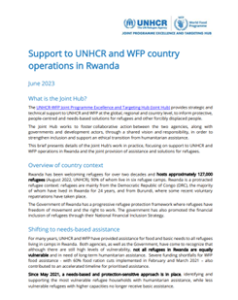The Government of Rwanda has a progressive refugee protection framework where refugees have freedom of movement and the right to work. The government has also promoted the financial inclusion of refugees through their National Financial Inclusion Strategy.
For many years, UNHCR and WFP have provided assistance for food and basic needs to all refugees living in camps in Rwanda. Both agencies, as well as the Government, have come to recognize that although there are still high levels of vulnerability, not all refugees in Rwanda are equally vulnerable and in need of long-term humanitarian assistance. Severe funding shortfalls for WFP food assistance – with 60% food ration cuts implemented in February and March 2021 – also contributed to an accelerated timeline for prioritised assistance.
Since May 2021, a needs-based and protection-sensitive approach is in place, identifying and supporting the most vulnerable refugee households with humanitarian assistance, while less vulnerable refugees with higher capacities no longer receive basic assistance.
The full report is available here.

